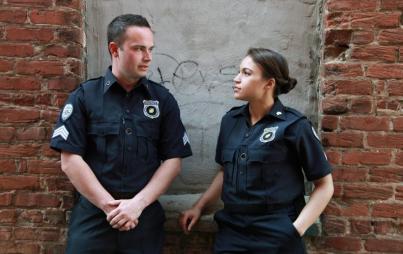
Blame is America’s worst medicine.
In the wake of unspeakable tragedy, being able to point the finger at a culprit helps sooth our national anguish. Following the Germanwings crash, we looked to the mental state of the pilot, Andreas Lubitz, who was routinely in treatment for psychological issues and depression; he told doctors he feared he was going blind. After the Columbine killings, critics had video games and rock music to pin the deaths of 13 people on. Marilyn Manson, who was commonly cited as an inspiration for the killers’ twisted mindset, wrote in Rolling Stone at the time: When it comes down to who's to blame for the high school murders in Littleton, Colorado, throw a rock and you'll hit someone who's guilty.”
After yet another mass shooting—in which 14 were shot and killed in San Bernadino, Calif.—we have plenty of blame to go around. Speculation suggests that the shooters were inspired by “radical Islamic fundamentalism.” That idea has ignited kneejerk fears about terrorists following us home after Paris and the looming “danger” of America’s Muslim population, but such bigoted angst has inspired absolutely no solutions. Thus far, Congress has only offered prayers: Sen. Ted Cruz (R-Texas) offered his condolences to the “victims, their families, and the first responders in San Bernardino.” The message was remarkably similar to the sentiments shared after last week’s attack on a Planned Parenthood center in Colorado Springs, Color.
San Bernardino marks the 355th mass shooting this year, meaning that our country has averaged more than one incident each day of 2015. Our familiar pattern of pointing the finger and offering condolences won’t stop another attack from happening tomorrow or—as recent patterns suggest—seven more shootings from taking place next week. What I’d like to see alongside these calls for a moment of silence is a government that stops being silent a problem they continue to create through legislative inaction.
In Australia, it didn’t take 355 San Bernardinos or Colorado Springs for the federal government to act. It only took one. Following the 1996 slaughter of 35 people in Port Arthur, a small, seaside community along the southern tip of Tasmania, the majority conservative Australian legislature instituted sweeping reforms to the country’s gun epidemic—including a successful buy-back program. Over the next decade, Australia’s death toll from gun violence dropped by 59 percent. According to the Atlantic’s Uri Friedman, what made the effort so effective was that “weapons-collection programs [were] combined with legislative reform, campaigns to shift public opinion, and civil-society involvement.”
Next week marks the third anniversary of the Sandy Hook massacre, in a gunman took the lives of 20 children and six staff members at the local elementary school. That event was supposed to be America’s own Port Arthur, the violent tragedy so unspeakable that a nation stood up and said: “No more.” In the days after the attack, a petition on the White House’s “We the People” webpage called on Congress to “produce legislation that limits access to guns.” The petitioners wrote, “While a national dialogue is critical, laws are the only means in which we can reduce the number of people murdered in gun related deaths.”
Those crucial pieces of legislation quickly failed in the Senate—which included a bill on universal background checks and a ban on assault weapons. And this week’s Congressional hearings on the issue were the same old story: Sen. Joe Manchin (D-WV) and Sen. Dianne Feinstein (D-Calif.) again called for expanding background checks, as well as preventing those on the Department of Homeland Security’s watchlist from obtaining a gun. Those measures were struck down by a majority vote.
In his opposition to the Manchin and Feinstein bills, newly elected House Speaker Paul Ryan (R-Wisc.) argued that America doesn’t need gun control—what we need is mental health reform. “What we have seen—and a common theme among many of these mass shootings—is a theme of mental illness,” Ryan told CBS This Morning on Thursday. “And we need to fix our mental illness laws, our policies. They're outdated. And that is something that we are working on right now.” This explanation tends to be popular with Americans. According to the Washington Post, “by a more than 2-to-1 margin, more people say mass shootings reflect problems identifying and treating people with mental health problems rather than inadequate gun control laws.”
Although the idea that the mentally ill are responsible for mass shootings has been widely debunked, Ryan plans to push legislation to fix America’s mental health crisis. But in addition to its likely ineffectiveness, Paul Ryan’s plan probably won’t survive the GOP. Republican presidential candidates like Sen. Marco Rubio (R-Fla.) and Jeb Bush have repeatedly suggested that “crazy people with a gun” are going to do whatever they want anyway. Here’s Trump’s very on brand take: “It doesn’t matter how well you fill them in, at some point, some wacky, crazy guy with a high IQ, but who’s totally nuts, is going to get through that crack.” Meanwhile, Florida governor Jeb Bush compared these issues to putting fences around pools.
These remarks speak to the biggest issue with blame: It actually helps us do nothing. By pinning mass shootings on an allegedly unstoppable force, this argument suggests that the issue is out of our control; we can no more halt America’s unprecedented rate of gun violence than we can harness the winds or dry the rain. But if you’re really, truly looking for a finger to point, Sen. Richard Blumenthal (D-Conn.) has a suggestion: “Congress is complicit in these mass murders when it fails to act.” It’s time to hold responsible a broken, complacent system that would rather watch innocent Americans get gunned down every single day than come together across partisan divides to prevent these killings.
Blame might sound nice, but what America needs most is accountability: We will never stop the violence until we elect a government that’s capable of doing its job.







